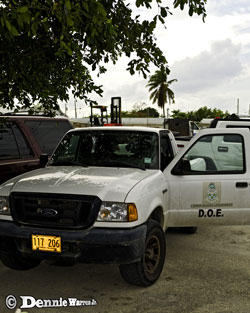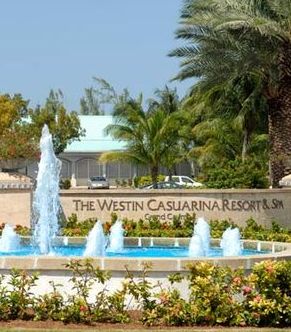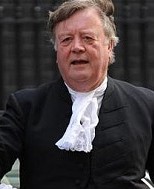Archive for February 16th, 2011

Poacher steals DoE truck
 (CNS): Updated — A man suspected of violating the Marine Conservation Law made off in one of the Department of Environment’s trucks on Wednesday afternoon when DoE enforcement officers tried to apprehend him. The man, who was reportedly found taking a large number of conch and lobster in South Sound, stole the DoE vehicle as he tried to avoid arrest by officials, one of whom was injured with a fish hook by the suspect. The poacher was then pursued by a joint team of RCIPS officers and members of the DoE. Police eventually apprehended both him and the DoE truck on Bodden Road, George Town. Police said they had arrested a 52-year-old man for traffic and marine offences. (Photo by Dennie Warren Jr)
(CNS): Updated — A man suspected of violating the Marine Conservation Law made off in one of the Department of Environment’s trucks on Wednesday afternoon when DoE enforcement officers tried to apprehend him. The man, who was reportedly found taking a large number of conch and lobster in South Sound, stole the DoE vehicle as he tried to avoid arrest by officials, one of whom was injured with a fish hook by the suspect. The poacher was then pursued by a joint team of RCIPS officers and members of the DoE. Police eventually apprehended both him and the DoE truck on Bodden Road, George Town. Police said they had arrested a 52-year-old man for traffic and marine offences. (Photo by Dennie Warren Jr)
The DoE has confirmed that the vehicle was taken during the attempted apprehension of the suspect after the marine officer was injured but it was recovered after the chase. DoE staff are currently assisting the police with the enquiry.

Diet soda linked to heart attacks
 (CNS): Opting for sugar-free fizzy drinks may seem the solution to staying healthy for those who love the taste of these popular beverages. But new research has shown they could increase the risk of having a stroke or a heart attack. The research, by University of Miami Miller School of Medicine, was presented during the American Stroke Association’s International Stroke Conference 2011 in Los Angeles. The scientists found that if you drink diet soda – instead of the sugar variety – you could still have a much higher risk of stroke or heart attack compared to those who do not drink soda.
(CNS): Opting for sugar-free fizzy drinks may seem the solution to staying healthy for those who love the taste of these popular beverages. But new research has shown they could increase the risk of having a stroke or a heart attack. The research, by University of Miami Miller School of Medicine, was presented during the American Stroke Association’s International Stroke Conference 2011 in Los Angeles. The scientists found that if you drink diet soda – instead of the sugar variety – you could still have a much higher risk of stroke or heart attack compared to those who do not drink soda.
But there was no increased risk for those people who drank regular fizzy drinks compared to none fizzy drinks. In findings involving 2,564 people in New York, the researchers said those who drank diet soda every day had a 61 percent higher risk of vascular events than those who didn’t drink soda.
“If our results are confirmed with future studies, then it would suggest that diet soda may not be the optimal substitute for sugar-sweetened beverages for protection against vascular outcomes,” said Hannah Gardener, lead author and epidemiologist in the Department of Neurology at the Miller School.
British Heart Foundation senior cardiac nurse Amy Thompson said: “This research seems to show a link between diet fizzy drinks and a greater risk of having a heart attack but it is unclear why this occurs. We’d need to see much more research before we could draw any definite conclusions.
“We already know that too many high-sugar fizzy drinks are bad for our teeth and excess calories from them can make us put on weight, which is a risk factor for heart disease. Healthier alternatives people can enjoy are water, un-sweetened fruit juice or low fat milk.”
Dr Sharlin Ahmed, Research Liaison Officer at The Stroke Association says; “It is a well known fact that leading a healthy lifestyle can significantly reduce your risk of having a stroke. According to this study drinking diet fizzy drinks on a regular basis could pose the same or even higher risk for cardiovascular disease as standard fizzy drinks, providing a word of warning to those who often opt for diet versions in order to be ‘healthy’.
Drinking fizzy drinks in moderation will not be detrimental to yourhealth. Everyone can reduce their risk of stroke by consuming a balanced diet, low in saturated fat and salt, and exercising regularly.”
In separate research involving 2,657 people, scientists found that high salt intake, independent of the hypertension it causes, was linked to a dramatically increased risk of ischemic strokes, in which a blood vessel blockage cuts off blood flow to the brain. In the study, people who consumed more than 4,000 milligrams per day of sodium had more than double the risk of stroke compared to those consuming less than 1,500 milligrams per day.

Westin resort survives under co-receivers
 (CNS): One of Grand Cayman’s most important resorts appears to have survived the financial turmoil of its owners for at least the foreseeable future. A new management team has now been put in place to return the Westin Causaurina Resort to profit. A statement from the team on Wednesday revealed that local company WMC, in affiliation with the US based Pyramid Hotel Group, have been appointed co-receivers of Galleon Beach Resort Limited along with Russell Smith of Johnson Smith Associates Limited. The new manager confirmed that Columbia Sussex was no longer involved with the hotel and that it would be business as usual despite the changes.
(CNS): One of Grand Cayman’s most important resorts appears to have survived the financial turmoil of its owners for at least the foreseeable future. A new management team has now been put in place to return the Westin Causaurina Resort to profit. A statement from the team on Wednesday revealed that local company WMC, in affiliation with the US based Pyramid Hotel Group, have been appointed co-receivers of Galleon Beach Resort Limited along with Russell Smith of Johnson Smith Associates Limited. The new manager confirmed that Columbia Sussex was no longer involved with the hotel and that it would be business as usual despite the changes.
News that the well-known Seven Mile Beach resort was facing foreclosure came last November when credit rating agency Realpoint LLC revealed that the Columbia Sussex Corp, the parent company, was having difficulty meeting payments on loans against the hotel.
On Wednesday the new manger of the resort, Larry Vitagliano, promised a smooth transition for staff and guests as WMC Limited took over withthe help of the Boston based hotel company, Pyramid. PHG has 64 hospitality assets in the Caribbean and the US, including all major brands, from mid-market to select service properties.
He said now that the hotel was in new hands the focus would be on extending the reputation and revenue of the resort, which was still one of the busiest on the island.
“It will be business as usual at the Westin,” said Vitagliano, who has reportedly been in the hotel business for some two decades. “The resort will remain fully operational and guest services will continue to be at the highest standard. There will not be any disruption for guests, bookings, events, staffing, vendors or suppliers. We want to make clear that this is a long term commitment for us. We will be operating the Westin for the foreseeable future until the hotel is returned to profitability.”
The new manager said that the team recognised the importance of the hotel to Cayman’s tourism business and that the change in management would not impact business at the hotel. He said WMC had spoken with the government and updated it on the situation with the business and employees.
“We are grateful for the facilitation that government has given to WMC Limited, which we hope will safeguard the uninterrupted operations of the hotel and the employment of its staff,” Vitagliano added.
The premier has reportedly stated that government had been committed to keeping the Westin open and was pleased the difficult transition at this important resort was going smoothly and was looking forward to working with Pyramid.

New scholarship to fund study in old profession
 (CNS): A new scholarship has been created to offer young Caymanians the opportunity to pursue one of the country’s oldest professions. The education ministry in partnership with the Seafarers Association and the Cayman Maritime Heritage Foundation will be giving $20,000 annually to students wishing to pursue maritime related careers, once one the most common professions for Caymanians but now rarely pursued. The Gwen Bush Memorial Scholarship Fund, which has been added to the scholarship secretariat’s registry, is named for Cayman’s primary contact for the Southwell Recruiting Company, which hired seamen for National Bulk Carriers in the mid 1900s, GIS revealed in a release this week.
(CNS): A new scholarship has been created to offer young Caymanians the opportunity to pursue one of the country’s oldest professions. The education ministry in partnership with the Seafarers Association and the Cayman Maritime Heritage Foundation will be giving $20,000 annually to students wishing to pursue maritime related careers, once one the most common professions for Caymanians but now rarely pursued. The Gwen Bush Memorial Scholarship Fund, which has been added to the scholarship secretariat’s registry, is named for Cayman’s primary contact for the Southwell Recruiting Company, which hired seamen for National Bulk Carriers in the mid 1900s, GIS revealed in a release this week.
Minister Rolston Anglin signed a memorandum of understanding to launch the scholarship last week with the Seafarers Chairman Hartmann DaCosta and the foundation president Jerris Miller. The two organisations came up with the idea and representatives from both entities will be on the Gwen Bush Scholarship selection panels. The scholarship’s first recipient is Ned J. Miller III, Jerris Miller’s son, who had been selected for the scholarship before the ministry joined the partnership with the two organisations.
Miller is already pursuing undergraduate qualifications at the International Yacht Restoration School in Newport, Rhode Island, and Anglin presented the first scholarship cheque to Ned’s father.
Gwen Bush’s sons, John and David Bodden, and John’s wife, Nancy, were also in attendance. John Bodden offered his thanks to the government and the two associations for honouring his mother. “My mother was a special person who believed in hard work and taught us that your reward was your pay,” he informed the panel. “She would always say that fame and fortune go as fast as they come, but a good education lasts forever.”

Bribery act back on track, says UK justice secretary
 (Daily Telegraph): Ken Clarke, Justice Secretary has said legitimate businesses are "frightened" by the Bribery Act but made clear that the UK government had no intention of "watering down" the rules. Speaking in the Commons, Clarke said government was committed to the anti-corruption laws, which were passed under the previous Labour administration, despite delaying their introduction twice. "Corruption is bad for all business, including British business, when we are trying to export to other countries,” Clark said. "It’s very important we put ourselves where we should be: at the forefront of stamping out corruption not only in the developing world, but in international trade generally."
(Daily Telegraph): Ken Clarke, Justice Secretary has said legitimate businesses are "frightened" by the Bribery Act but made clear that the UK government had no intention of "watering down" the rules. Speaking in the Commons, Clarke said government was committed to the anti-corruption laws, which were passed under the previous Labour administration, despite delaying their introduction twice. "Corruption is bad for all business, including British business, when we are trying to export to other countries,” Clark said. "It’s very important we put ourselves where we should be: at the forefront of stamping out corruption not only in the developing world, but in international trade generally."
Clarke said he had "reassured" his US counterpart the UK was "going to implement the Act".
Labour’s Paul Goggins asked for an assurance there would be no loopholes that would "enable British companies to turn a blind eye to corruption".
McTaggart sits in temp chair at Cayman Finance
(CNS): Following the unexpected departure of Anthony Travers, Cayman Finance has appointed Roy McTaggart as interim chairman effective immediately, the association said on Wednesday. McTaggart is the Managing Partner at KPMG and has over 25 years experience in the financial industry here. Cayman Finance officials said that the interim appointment will provide the required strategic direction until a permanent chairman is found. An Executive Committee has also been established to assist McTaggart in his role as well as dealing with organizational issues.
Travers announced his departure from the chair of Cayman Finance after two years via a London public relations firm last week but he has not confirmed the reason for his sudden resignation. Cayman Finance said in a release that Travers was departing to spend “more time tending to his other business ventures and to spend time with his family.”
Travers was the first representative of the industry body to vigorously defend Cayman’s financial sector against critics and misrepresentation on a variety of forums, from letters to the US president to televised media interviews.
McTaggart will now work with the committee to continue the work started by Travers and to find a new figurehead for the association. The committee includes Dan Scott from Ernst & Young, Nick Freeland of Pricewaterhouse Coopers, Gonzalo Jalles of HSBC and Peter Cockhill from Ogier
"I am pleased to accept thisrole which will provide continuity of service whilst a permanent appointment is made,” he said. “We are working with the Financial Services Commission and with CIMA to help ensure that there is an articulate and sophisticated understanding of Cayman’s positive role in international finance."
McTaggart is a member of the Florida and American Institutes of Certified Public Accountants; is council member of the Cayman Islands Society of Professional Accountants; and is a member of the Financial Services Council, an advisory group to the Cayman Islands Government.

Ethics committee close to finishing law
 (CNS): The Committee for Standards in Public Life (CSPL) is very close to finalising the law it requires in order to carry out its constitutional mandate. In the committee’s first report after it was established in accordance with the country’s 2009 constitution, the members noted that without a specific law in place it would be difficult for the CSPL to enforce those standards. Since then the CSPL has been working on the necessary legislation, which it says will enable it to fulfil its constitutional mandate when it comes to upholding ethical standards of politicians and public servants. The chair has also confirmed that the committee’s second report has been completed and will begiven to the Legislative Assembly for tabling in the next session.
(CNS): The Committee for Standards in Public Life (CSPL) is very close to finalising the law it requires in order to carry out its constitutional mandate. In the committee’s first report after it was established in accordance with the country’s 2009 constitution, the members noted that without a specific law in place it would be difficult for the CSPL to enforce those standards. Since then the CSPL has been working on the necessary legislation, which it says will enable it to fulfil its constitutional mandate when it comes to upholding ethical standards of politicians and public servants. The chair has also confirmed that the committee’s second report has been completed and will begiven to the Legislative Assembly for tabling in the next session.
Despite not having its law in place yet, the chair, Karin Thompson, said the committee has still been meeting regularly and has also launched its website. The minutes of the five meetings the CSPL has held since last August, when it published its first report, are now on the site as well as other documentation relating to the committee.
As the committee develops its role it is expected to examine not just the potential conflicts of interest for political representatives but also civil servants. It will be looking at government contracts and tenders, and in the December meeting the committee raised the question of the composition of the Central Tenders Committee, suggesting that members should possess relevant professional qualifications.
The issue of government procurement in all countries is always an area of potential concern for ethics and anti-corruption committees. Given the questions that have been raised about Cayman’s tendering process and the circumvention of its recommendations by government in recent bids, the public will be turning to the CSPL to answer some of those questions.
The CSPL is separate and apart from the Anti-Corruption Commission, which was established well over one year ago under the chairmanship of the police commissioner. This commission, in contrast to the CSPL, appears not to have a website, has produced no report and is understood to have met on only three occasions last year. The commission was reportedly expected to engage in a training programme (more than one year after its formation) in either January or February of this year with the Attorney General’s Office to look at the legislation and the powers afforded the commission. It is also expected that at some point a public education campaign will be launched to explain what that commission will do.
It is not yet clear what spheres of local public life the Anti-Corruption Commission will examine but it is designed to assist in overseas cases of corruption when Cayman entities may be involved. Although it differs from the CSPL, there is likely to be some overlap in the local domain but again it is not yet clear how the public can report concerns to members about corruption and how those complaints will be handled.
Given that it is expected to examine corruption in law enforcement as well as the wider community, there is a clear conflict of interest created by the chair, which does not appear to have been addressed.
The commission was created in accordance with Cayman’s Anti-Corruption Law, which was passed in 2008 but came into effect in January 2010. It is not a constitutional commission but a law to bring Cayman in line with international standards and obligations.
In a release at the time the members were appointed, government officials said the body would be responsible for administering the law. It is supposed to consider and investigate any report of corruption, including any attempted offences or conspiracies to commit corruption.
It has the power via the Grand Court to order a freeze on a person’s bank account or property for up to 21 days if there is reasonable cause to believe that the person is involved in corruption.
Commission members can also request banks and other entities to release information needed in corruption investigations. It is not yet known if the commission has opened any investigations or received any allegations of corruption either locally or from overseas.
Aside from the police commissioner, members include the complaints commissioner; the auditor general; Sir Peter Allen, a former Chief Justice of Uganda; and former banker Leonard Ebanks.

CUC to pay for green power
 (CNS): The country’s power company will be paying people who are generating renewable energy 37 cents per kWh for the electricity they send back to the grid under a new programme launched this month. Following agreement with the electricity regulator, CUC has revised its Consumer Owned Renewable Energy programme (CORE) and introduced a Feed-in Tariffs structure (FIT). The firm said this provides significant incentives to consumers generating energy from renewable sources and will allow local customers to connect small scale solar systems or wind turbines to CUC’s distribution system and to reduce their monthly energy bills while connected to the CUC grid.
(CNS): The country’s power company will be paying people who are generating renewable energy 37 cents per kWh for the electricity they send back to the grid under a new programme launched this month. Following agreement with the electricity regulator, CUC has revised its Consumer Owned Renewable Energy programme (CORE) and introduced a Feed-in Tariffs structure (FIT). The firm said this provides significant incentives to consumers generating energy from renewable sources and will allow local customers to connect small scale solar systems or wind turbines to CUC’s distribution system and to reduce their monthly energy bills while connected to the CUC grid.
Managing Director of the Electricity Regulatory Authority of the Cayman Islands, Philip Thomas, said the development of renewable energy systems is critical to reducing Cayman’s dependence on diesel. “The FIT program is consistent with ERA policies and that of the recently formed Government National Energy Policy Committee,” he added following the approval of CUC’s programme.
To begin with FIT will run as a pilot programme for a year or until the quota of 1MW of capacity has been filled on a first come first serve basis at 37 cents per kiloWatt hour, CUC has said. Applicants will be able to start exporting energy to the grid within 30 days of completion of the application to CUC, subject to approval by the Central Planning Authority. The FIT contract agreement will be for a term of 20 years to allow owners a reasonable return on their investment in renewable energy.
According to CUC, customers will be billed monthly at the normal retail rate, currently at 30 cents per kWh, for their total energy consumption and then will be credited monthly at the FIT rate of 37 cents. At the end of each calendar quarter, CUC will make a payment to CORE customers for the credit balance on their accounts.
President and Chief Executive Officer of CUC, Richard Hew, said the firm was pleased to introduce the Feed In Tariffs to both existing and new CORE customers. He said they would be able to generate energy through renewable means while connected with and benefitting from CUC’s reliable electricity distribution system.
“We look forward to an increase in the amount of renewable energy available to our system as we introduce some diversification of energy sources and displace fossil fuel used and its associated emissions,” Hew said of the this first step towards greener future for the island
The minister responsible for power, Juliana O’Connor-Connolly, said government wholeheartedly supported the FIT programme. “It dovetails into the National Energy Policy, as a means of encouraging consumers to reduce their utility bills while doing a small but important part in becoming more environmentally conscious.”
CUC officials said the maximum permitted size of the individual renewable energy systems will be the lesser of the CORE customer’s peak demand for existing systems measured over a period of up to twelve months, where that information is available, or estimated peakdemand for new connections, with a maximum of 20 kW for residential systems and 50 kW for commercial systems.
There is no difference between the residential FIT rate and the commercial FIT rate, but to provide opportunities for everyone under the pilot, commercial customers will be limited to 70 percent of the 1 MW capacity, leaving the rest for residential customers.
This programme is at least a baby step towards protecting the environment. “By utilizing renewable energy instead of fossil fuels to generate electricity, CUC and its customers will be able to reduce exhaust gas emissions, reduce the use of non-renewable natural resources and contribute to the overall protection of the environment both in Grand Cayman and globally,” the firm said of the move.
At a recent press briefing, Hew said that CUC was working hard on finding reliable renewable energy resources but he said that it would be a long time before alternative energy sources could generate anything more than a fraction of the power needed to keep Grand Cayman plugged in. He said the focus was still on wind power, which he said was the most promising for Cayman in the immediate future as solar panels were still not yet cost effective. The challenge, however, for the wind project was finding a suitable location for the number of turbines needed.
Last year the power firm lost out on its preferred location for a wind farm in East End to the government’s weather radar system.“We are still committed to generating power through wind but we either have to find a way to co-exist with the radar or find another location,” Hew said.
Further details on and how to sign up are available at CUC’s Customer Service Department at 949-4300 or log on to www.cuc.ky. An agreement between the consumer and CUC will set out the terms under which services, connectivity, metering and billing credits will be governed.
On Cayman Brac in February 2007, the Earl of Wessex broke ground for the Cayman Brac Power & Light Company’s Wind Power Project at Stake Bay Point on the Bluff but this project appears to have stalled.

Online news media and social networking
As we have all seen in the international news recently, real time news media and online news, coupled with social networking like FaceBook and Twitter is changing the world. Online news in the Cayman Islands is changing the way we see our politicians. Less than two decades ago we had the coconut telegraph and the Marl Road. If you hadn’t heard a rumor by 10:00am, start one and stories traveling the Marl Road could change content completely from West Bay to George Town.
Knowing a politician or someone in government became a must and politicians pressuring the print media and private sector with bullying and intimidation along with retribution, in my opinion, is a stain in Cayman’s history. There are varied opinions about Desmond Seales’ Cayman Net News but he did start the ball rolling by opening up "letters to the editor" and pressing for a position where bullying and retribution from political figures against anyone who dared to criticize was at least out in the open.
In a very short period of time the Cayman Islands’ political landscape has changed and, in this writer’s view, not for the better. The islands had a generation of politicians for the people and the country. With ExCo we had several elected members sitting down and governing the country. The majority of the time we agreed with Miss Annie, Mr Craddock, Captain Charles and Benson, Mr Norman and Mr Truman and the people felt they had elected members working for them.
One of the worst days in Cayman’s history was when the then government voted in large salaries and benefit packages for elected officials. That was the beginning of "being a politician meant becoming a wealthy person". Along with the comfortable income and retirement came a license for conflicts of interest. In other countries it is an abuse of power that is normally not tolerated. No paper directorships, gifts, cars, partnerships, channeling business to personal companies, making cronies wealthy with inflated government contracts. You all know the list by now.
In the good times everyone seemed to tolerate the new politicians and what they felt they deserved from being an elected member.But we are now in the bad times and true leaders need to show their metal and they have fallen short and are not governing the way out of this mess. They are too used to governing mainly for themselves and a little for the people. This is one of the reasons the present government focuses on "projects" rather than non income producing issues like crime, education, health and social services. History will show, though, that one of the events that will save Cayman politically was the world economic slow down.
The party system evolved because we had to many good leaders in government. The two party system has never really worked for all the people. Mr Bush created the UPD as a vehicle for power, control, personal and political aspirations. The PPM had to be formed to try and counter what was happening. Now our political model has been morphed into a terrible situation where one man is running the country. This is not healthy for any democracy or our government and there needs to be change.
Online media and social networking will help to bring accountability, transparency and change to the Caymanian political landscape. Cayman News Service is the leader of online media and hopefully CayCompass will follow with even more objectivity. Every day hard working, interested, good frustrated people, voters, residents have been able to question, ask for answers, accountability and criticize the government in power. This is very healthy for any democracy and leads to the people being served. Look at what we have found out about the tendering system, the health care system, unbalanced government accounts, slush funds, first class junkets by elected members, benefit packages, cronyism, back room deals — the list is endless.
Mr Bush has stated that, as he calls them, "the bloggers" will ruin Cayman. The bloggers, online media, social networking information, along with open dialogue, the eradication of politician bullying, intimidation and retribution towards the private sector, freedom of the press and speech, will save the Cayman Islands from the political quagmire it is presently in.
What has happened in Egypt is dramatic and unique. The USA media calls it "The Facebook Revolution" but it is deeper than that. Young educated Egyptians want a vote, a say and freedom of speech. With the help of the media and a new way of communicating they are succeeding.
Cayman is so lucky. We have a vote and a new way to communicate as well — our online media. Power politicians will now be seeking ways to pressure the media and perhaps stall or slow down public information because information is their enemy.
We have the vote and the online vehicles to communicate. It’s time for a peaceful, informed vote for change in the Cayman Islands to leaders for the people.
"Press on Cayman!"

Men run down on pavement
 (CNS): Two pedestrians were injured yesterday evening after being knocked down by a car while on the pavement on Eastern Avenue. One of the victims remains in hospital and is said to be in stable condition with abdomen, chest and arm injuries. The incident occurred around 5:30 pm on Tuesday (15 February) when the car reportedly mounted the pavement near CaymanShoe Shop, police said. The car crashed into a second vehicle after hitting the two men, who were walking along the pavement at the time. Although police arrested the driver, who was uninjured, on suspicion of driving under the influence, he was released later in the evening. (Photo Dennie Warren Jr)
(CNS): Two pedestrians were injured yesterday evening after being knocked down by a car while on the pavement on Eastern Avenue. One of the victims remains in hospital and is said to be in stable condition with abdomen, chest and arm injuries. The incident occurred around 5:30 pm on Tuesday (15 February) when the car reportedly mounted the pavement near CaymanShoe Shop, police said. The car crashed into a second vehicle after hitting the two men, who were walking along the pavement at the time. Although police arrested the driver, who was uninjured, on suspicion of driving under the influence, he was released later in the evening. (Photo Dennie Warren Jr)
One of the men hit by the car received leg injuries and was treated at the George Town Hospital before being released.
Police enquiries are continuing